In the Yoruba country, once someone hits the public arena, the first question asked is, “Who is his (her) father?” I know a Yoruba chap also known to Lasisi Olagunju over whose paternity there is a mysterious shroud; a fellow whose stated name is false, whose declared age is false, whose proclaimed hometown is false, whose professed academic laurels are false and whose fangs and talons are currently plunged into the apple of a tree he contributed next to nothing in planting and nurturing. Would the chap’s unflattering antecedents justify calling every Yoruba person a fraudster?
Lasisi Olagunju published on June 26, 2023, an article entitled ℎ ℎ , in his Monday Lines column of the . The piece was outrageously Igbophobic. Predictably it elicited disapproving reactions.
A rejoinder from Dr. Okey Iheduru, a US-based professor of political science, said:
– Advertisement –
“I’m always surprised how otherwise intelligent Nigerians of other ethnicities can’t pass up any opportunity to totalise, homogenise and poke their fingers in the eyes of Ndigbo as they psycho-analyse an ethnic group numbering over 60 million.
“How on earth does Mr. Olagunju justify this hate speech based on the rantings of a few people he came across on social media and his two acquaintances in the “brown envelope” profession? There are over 60 million Ndigbo in Nigeria and in the Diaspora. Where and when did all these people collectively disown the new CNS? Couldn’t he have at least referenced the effusive celebrations across Igbo Ezi na Ulo over the Senior Officer’s elevation to Navy Chief?
“Mr. Olagunju may be deluded about “Yoruba unity” vs “Igbo self-hate,” but someone needs to remind him that such “discrimination” and within-group stereotypes are the stuff of ethnic identity brokerage and narratives around the world. There’s more in-group division among the Jews than between them and the Arabs. Yorubaland is replete with such divisions and stereotypes – from Ijebuland to the northern outskirts in Kwara and Kogi States. So is Ijawland, Idoma, Tiv, Zulu, the English, Russians, etc. This doesn’t excuse the sometimes-tragic consequences of this aspect of “imagined community” making. To make it the exclusive heritage of the Igbo by Igbophobic public intellectuals is the height of dangerous ignorance that often softens the ground for ethnic demonisation and eventually ethnic cleansing and even genocide.”
We shall return to Professor Iheduru. Meanwhile, what was the meat of A service chief for the Igbo? Its impetus was Rear Admiral E. I. Ogalla’s appointment as the Chief of the Naval Staff. It sent Mr. Olagunju running off the handle: “But while Nigerians from other parts of the country rejoiced with the East, Igbos were loud on social media; they said Ogalla is not an Igbo name.” Thus, based on social media effluvia, Olagunju called Ndigbo incorrigible. He said the Igbo spent the civil war years eating lizards, mice, rats, bush rats and snakes, not forgetting their drudgery of pedalling bicycles on metal wheels instead of tyres. “You would think that a people who went through all that experience of horror (of the civil war) would learn. No.”
That was not all. Olagunju called up Ebenezer Williams (Abiodun Aloba) and Tai Solarin, two long-dead Yoruba columnists, to support his pet theory that, if Ndigbo got the chance, they would decimate the rest of the country.
– Advertisement –
To the informed, Olagunju’s wildness is unsurprising. Two examples validate this assertion. On Monday, September 12, 2022, Olagunju published ℎ ℎ . In it, he mentioned Uju Anya, a US-based Igbo professor of Linguistics and Chief Emeka Anyaoku, the former Commonwealth Secretary General. Ms. Anya had cursed Queen Elizabeth for Britain’s role in the Nigerian civil war. But Chief Anyaoku had adulated the departed monarch. Yet, Olagunju passed this comment: “Igbo people anywhere are very enterprising people. But my people have a saying about strong, enterprising people who talk too much about their supposed strength and who lack good strategy. They say such are the fathers of the weak. The world is a forever battlefield; you cannot win there by turning everyone into your enemy.” He continued: “Probably, a consequence of Queen Elizabeth’s death is a reopening of the Nigerian wound. Nigeria fought a civil war which ended in January 1970. The Igbo who lost the war believe it has not ended. They think they deserve explanations and apologies from Nigeria for defeating them. They also believe other parts of Nigeria are still fighting them. But that is not true…”
Chief Anyaoku has a Yoruba spouse. He has never said a word amiss of the Yoruba. Perhaps, for Olagunju, they were these enough reasons to conjure the elder statesman into a Yoruba man whose views may not draw comments because they are a ? Given his national and international standing, Chief Anyaoku’s kind words for Queen Elizabeth should have had far more import than Uju Anya’s barbs. Ms. Anya was born years after the civil war, and until the controversy generated by the queen’s transition, was unknown in Nigeria. But Olagunju didn’t want to know. He latched on her opinion to excoriate Ndigbo. He probably didn’t notice that the social media of his wanton reliance also recorded scores of Britons (including the English) who had unkind words for the departed monarch, and none of whom was as much as tut-tutted for their views.
On March 13, 2023, just before the Lagos State gubernatorial ballot, Olagunju published another column entitled The Scramble for Lagos. He said: “The political owners of Lagos have reached out for the magical wand of crying wolf where there is actually one. They are saying voting for Rhodes-Vivour is equal to handing over Lagos to the Igbo because his mother is Igbo. And, I continue to ask if that makes sense. Gbadebo is an ìbílè Èkó (original Lagosian). Who locks out an omo onílé (child of the house owner) because his mother is from the other village? But Gbadebo has also been very insensitive and careless in flaunting his Igbo support base. As an ‘aje butter’, he may not know what it is to be vulnerable to kókó (protrusions) and be seen not only feasting on the head of Ìmòdò (warthog) but also carelessly rolling with club-wielding gangsters.
Is it fair for Olagunju to characterise the Igbo as wolves and club-wielding gangsters simply because they would vote in their country? Has the vote transformed from a democratic instrument to an assault weapon? Is it appropriate for a great newspaper established by the great Chief Obafemi Awolowo to become a ready megaphone for vilifying Ndigbo based on unsubstantiated statements by unidentified Internet rats?
ALSO READ: Sustaining the momentum of hope
In April 2015, Oba Rilwanu Akiolu of Lagos warned Ndigbo in Lagos to vote for the APC gubernatorial candidate or be drowned in the lagoon. Yoruba monarchs are in the hundreds. Would it be rational to use Akiolu’s threat to Ndigbo of alternative political views as a handle to declare all Yoruba obas politically thoughtless?
In the Yoruba country, once someone hits the public arena, the first question asked is, “Who is his (her) father?” I know a Yoruba chap also known to Olagunju over whose paternity there is a mysterious shroud; a fellow whose stated name is false, whose declared age is false, whose proclaimed hometown is false, whose professed academic laurels are false and whose fangs and talons are currently plunged into the apple of a tree he contributed next to nothing in planting and nurturing. Would the chap’s unflattering antecedents justify calling every Yoruba person a fraudster?
Olagunju’s problem blows a whistle. The Igbo are no herdsmen, and they are not the ethnic group who, through eight years of the Buhari blight and to this day, have been raping, maiming, and massacring people from other ethnic nationalities and expropriating their land. Yet, Olagunju says Ndigbo are looking to aggress Nigeria. Ndigbo never killed a man or woman to take over their inheritance. Ndigbo didn’t kill athletes from other ethnic groups to win Olympic and Commonwealth gold medals. They never killed to repeatedly captain the Super Eagles, the Golden Eagles, the Falcons, and other national football teams. Igbo parents didn’t kill students of other ethnic nationalities for their wards and children to invariably top the annual School Certificate, JAMB and NECO examinations.
Olagunju’s difficulty is compounded by the erroneous belief that Ndigbo are a defeated people. How could more than 60 million people spread across the globe be defeated? He gleefully cites the Igbo eating reptiles during the civil war, forgetting that the ethnic group did other things during that conflict. He needs to be reminded by no less a person than General Chukwuemeka Odumegwu-Ojukwu, the Biafran leader: “In the three years of the war, necessity gave birth to invention. During those three years of heroic bound, we leapt across the great chasm that separates knowledge from know-how. We built rockets, and we designed and built our own delivery systems. We guided our rockets. We guided them far; we guided them accurately. For three years, blockaded without hope of import, we maintained all our vehicles. The state extracted and refined petrol, and individuals refined petrol in their back gardens. We built and maintained our airports, maintained them under heavy bombardment. Despite the heavy bombardment, we recovered so quickly after each raid that we were able to maintain the record for the busiest airport in the continent of Africa. We spoke to the world through a telecommunication system engineered by local ingenuity; the world heard us and spoke back to us! We built armoured cars and tanks. We modified aircraft from trainer to fighters, from passenger aircraft to bombers. In the three years of freedom, we had broken the technological barrier. In the three years, we became the most civilised, the most technologically advanced Black people on earth. We spurn nylon yarn; we developed new seeds for food and medicines…” See Three Incredible Years Of Biafra on page 365 of Chuks Iloegbunam’s General of the People’s Army (Press Alliance Network Limited, Lagos; 2012)
Olagunju called Chinua Achebe “the Igbo greatest of all time.” What an understatement! Professor Achebe happens to be one of the greatest thinkers of this age. Here is a lesson on the Igbo people from the guru to Olagunju and his ilk: Akuebue addresses Eze Ulu in Achebe’s Arrow of God: “Apart from your high position as chief priest, you are also blessed with a great compound. But in all great compounds, there must be people of all minds, some good, some bad, some fearless and some cowardly; those who bring in wealth and those who scatter it, those who give good advice and those who only speak the words of palm wine. That is why we say that whatever tune you play in the compound of a great man, there is always someone to dance to it. I salute you.” (See page 100 of Heinemann’s 1986 edition of the masterpiece.)
The Igbo are of a great compound. But so also are the Yoruba. Any rhythm out of their ethnic repertoires would have sons and daughters of the soil expertly dancing to them. That is why, for instance, a Yoruba man delivered Ilorin, a Yoruba town, to Fulani suzerainty. People of Lasisi Olagunju’s mindset should stop bellyaching about Ndigbo. It doesn’t help them any because the anthill is beyond lifting and the rat is harmless to a metal pot. You must let Ndigbo be. Or you must let them leave. If they must stay, a way of entrenching national amity is the envisaged ℎ – the handshake across the Niger River between Ohanaeze Ndigbo and Afenifere.
Thinking commentators will, as a matter of course, first determine Ohanaeze’s position on any critical national issue before bathing Ndigbo with ordure. Ndigbo are excelling across the globe. Tirades against them cannot change the fact. Instead, it aligns the writers with that “celebrated” journalist cum political entrepreneur who visited the Kigali Genocide Memorial to condemn the Rwandan genocide only to return to Nigeria and orchestrate a campaign for Ndigbo to be chased from Lagos. Such an Igbophobic campaign, as Professor Iheduru pointed out, “softens the ground for ethnic demonisation and eventually ethnic cleansing and even genocide.”
Lasisi Olagunju knows or ought to know that a wise man shuts his trap when he has nothing sensible to say. Therefore, to borrow from the title of Fuji exponent Sikiru Ayinde Barrister’s 1982 song, we offer him this advice: !
You may be interested
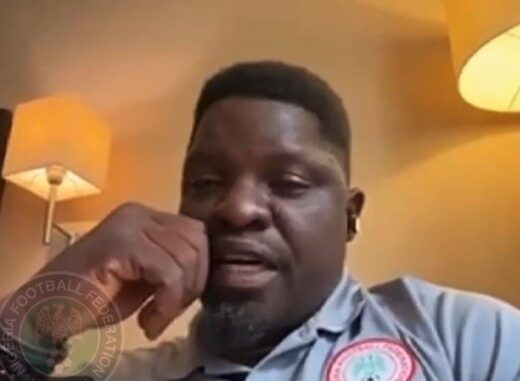
2024 CHANQ: History Not Kind To Us Against Ghana –Ogunmodede
Webby - December 24, 2024Home-based Super Eagles coach Daniel Ogunmodede says history has not been good to Nigeria when they face rivals Ghana.The home-based…

Ex-Chelsea Star Oscar Returns To Boyhood Club Sao Paulo
Webby - December 24, 2024Former Chelsea midfielder Oscar is returning to his Brazilian boyhood club Sao Paulo after 14 years, which included a long…
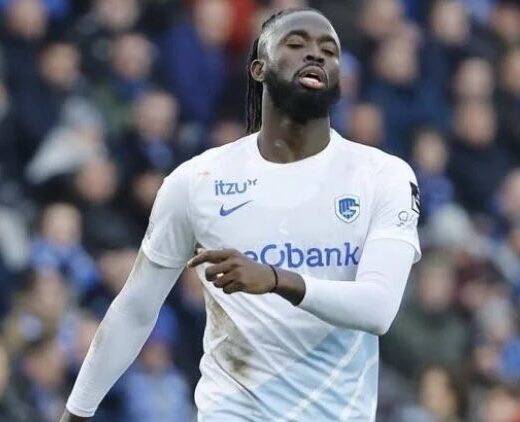
‘I’m Incredibly Proud’– Arokodare Talks Up Genk’s Unbeaten Home Streak
Webby - December 23, 2024Tolu Arokodare is full of excitement followingGenk’s historic victory over Anderlecht, reports Completesports.com.Sunday’s win at the Cegeka Arena was the…




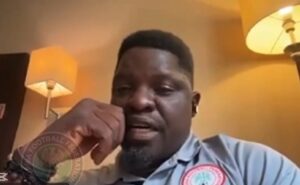

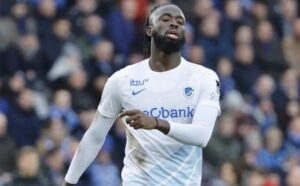


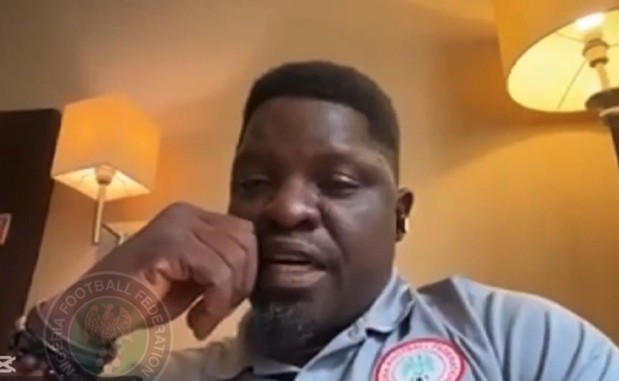

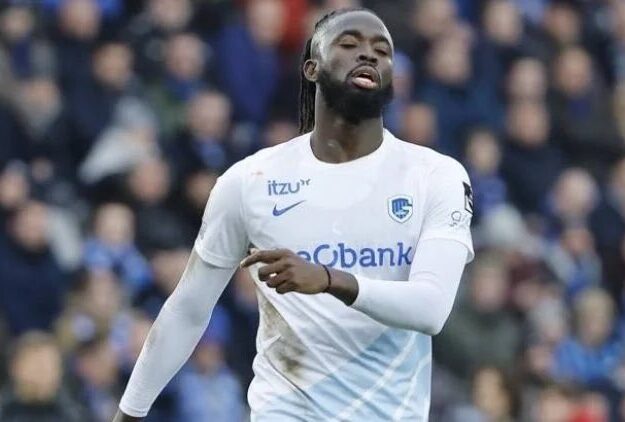








![American Pastor, David Wilson Seen Eating The Box Of Woman Who Isn’t His Wife [Video]](https://onlinenigeria.com/wp-content/uploads/2019/10/american-pastor-david-wilson-seen-eating-the-box-of-woman-who-isnt-his-wife-video-150x150.jpg)









